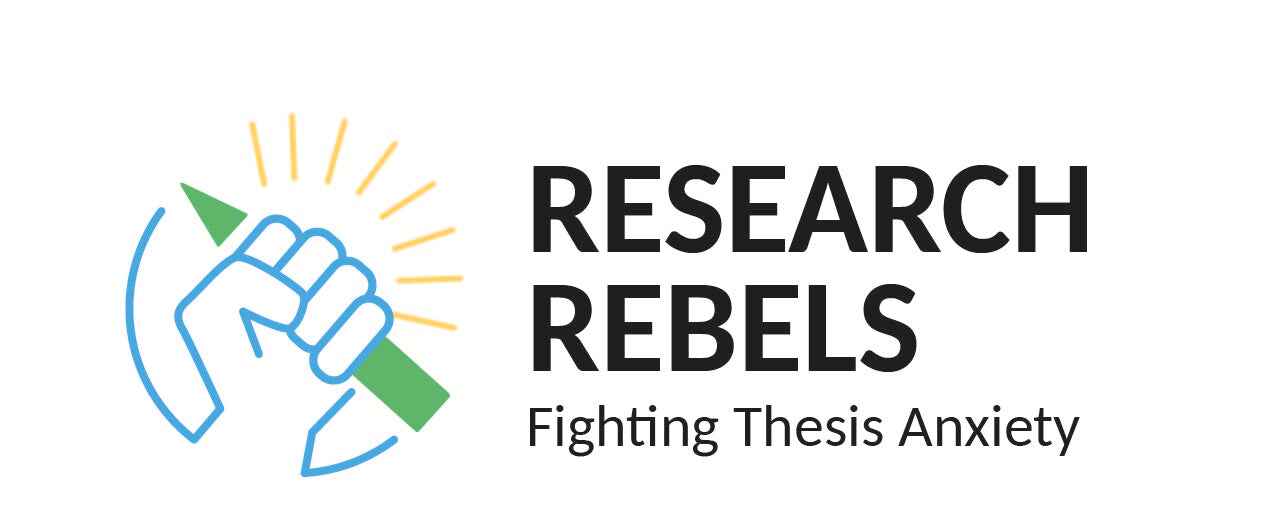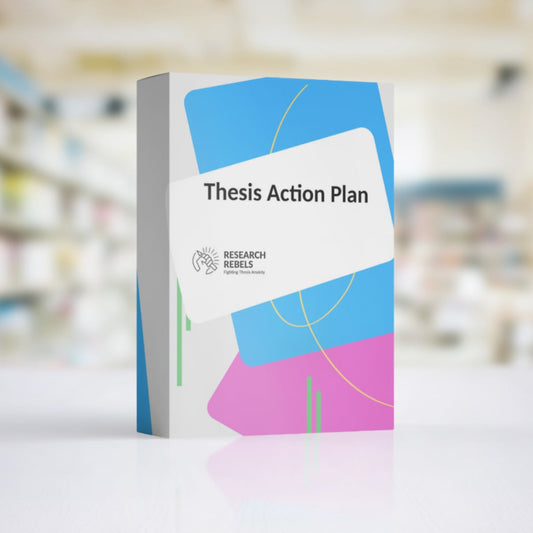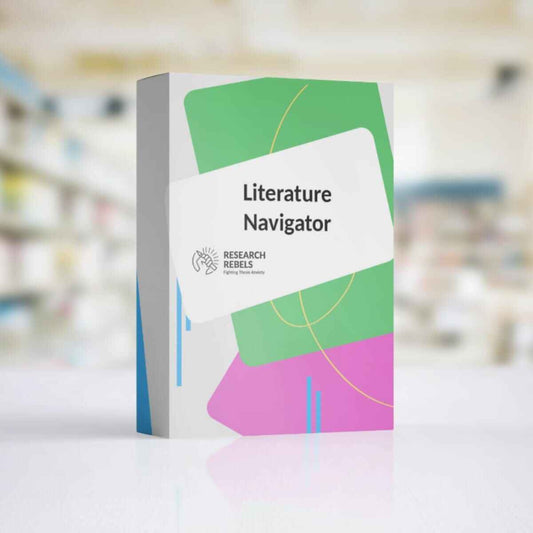Navigating Anxiety Over Thesis: Strategies for Success

Thesis writing is a pivotal and often stressful phase in a student's academic journey, with anxiety being a common obstacle. This article explores the multi-faceted nature of thesis writing anxiety and provides a range of strategies to help students navigate through it. From understanding the root causes to adopting effective writing practices and coping mechanisms, the goal is to empower students with the tools for a successful and anxiety-free thesis writing experience.
Key Takeaways
- Thesis writing anxiety stems from various sources, including fear of failure and overwhelming expectations, and manifests through symptoms like procrastination and self-doubt.
- Developing a structured Thesis Action Plan, setting realistic goals, and utilizing tools like Academic Project Planners can lay a solid foundation for thesis success.
- Effective writing practices involve understanding academic language, maintaining integrity, and incorporating feedback through
- significantly alleviate the anxiety associated with thesis writing. It is essential to remember that the journey of thesis composition is not only about fulfilling academic requirements but also about personal growth and learning. Therefore, embracing a holistic approach that includes proper planning, seeking guidance, and maintaining a balanced lifestyle will lead to a more rewarding and less stressful thesis experience.
- In conclusion, navigating the tumultuous waters of thesis composition requires a well-structured strategy that addresses both the intellectual and emotional challenges of the process. By implementing the strategies discussed, such as setting realistic deadlines, utilizing supportive resources like the Thesis Action Plan, and engaging with a community of peers, students can significantly alleviate the anxiety associated with thesis writing. It is essential to remember that the journey of thesis
Understanding the Nature of Anxiety Over Thesis
Defining Thesis Anxiety
Thesis anxiety is a prevalent concern among students, characterized by feelings of unease, stress, and worry about the ability to complete a thesis successfully. It's important to recognize that you are not alone in this experience. Identifying the sources of your thesis-related stress is crucial, as it often stems from a fear of failure, overwhelming deadlines, or the sheer volume of work required.
Common Triggers and Symptoms
You might find that thesis anxiety is common due to factors such as workload, perfectionism, and fear of failure. These triggers can manifest through symptoms like procrastination and self-doubt. Acknowledging these causes is the first step towards managing them effectively.
Psychological and Emotional Impacts
The psychological and emotional impacts of thesis anxiety can be significant. It can lead to feelings of inadequacy and can affect your overall well-being. Employing strategies such as breaking tasks into manageable parts, seeking support, and practicing self-care are essential in mitigating these effects.
Strategic Planning to Mitigate Anxiety
Developing a Thesis Action Plan
Developing a comprehensive action plan is your first step towards mitigating thesis anxiety. By breaking down your thesis into smaller, manageable tasks, you can reduce the overwhelming feeling and maintain a clear focus on your objectives. Start by outlining your main research question, objectives, and the methods you will use. This structured approach not only organizes your thoughts but also provides a sense of control over your project.
Setting Achievable Milestones
Setting achievable milestones throughout your thesis timeline is crucial for maintaining motivation and measuring progress. These milestones should be realistic, clearly defined, and spaced appropriately to give you enough time for in-depth research and writing. Consider using tools like Gantt charts or timelines to visualize your progress and stay on track.
Utilizing Academic Project Planners
Academic project planners can be invaluable in organizing and prioritizing your tasks. These tools help you keep track of deadlines, appointments, and meetings, ensuring that nothing slips through the cracks. They also allow you to allocate time effectively between different tasks, which is essential for successful time management in thesis writing. Utilizing these planners can significantly reduce your stress and help you maintain a steady pace throughout your thesis journey.
Effective Time Management Techniques
Prioritizing Tasks
To effectively manage your time during the thesis process, start by prioritizing tasks. Identify the most critical aspects of your research and writing that need immediate attention and allocate your time accordingly. This ensures that you focus on high-impact activities that significantly advance your thesis.
Avoiding Procrastination
One of the most common pitfalls in thesis writing is procrastination. To combat this, set clear, short-term goals and reward yourself upon achieving them. This method, often referred to as the Pomodoro Technique, encourages sustained concentration and productivity by alternating focused work sessions with short breaks.
Setting Realistic Deadlines
Setting realistic deadlines is crucial for maintaining a steady pace and avoiding burnout. Break your thesis into smaller, manageable tasks and establish deadlines for each. Regularly reassess and adjust these deadlines based on your progress and feedback from advisors to ensure they remain achievable.
Adopting Healthy Coping Mechanisms
Stress Reduction Techniques
In the midst of thesis writing, it's crucial to integrate effective stress reduction techniques into your daily routine. Consider engaging in activities such as yoga, meditation, or even simple breathing exercises to help manage your stress levels. These practices not only alleviate immediate stress but also enhance your overall mental clarity and focus.
Balancing Work and Life
To maintain your mental health during the thesis process, it's essential to strike a balance between your academic responsibilities and personal life. Ensure you set aside time for social activities and personal interests to prevent burnout. Remember, maintaining a healthy work-life balance is key to sustaining productivity and fostering a positive mindset throughout your thesis journey.
Seeking Support from Peers and Mentors
Building a support network can significantly ease the pressures of thesis writing. Engage with peers and academic networks to foster support and collaborative opportunities. Don't hesitate to seek guidance from mentors who can provide valuable insights and encouragement. Remember, you're not alone in this journey, and leveraging the support of others can be a powerful tool in managing your thesis anxiety.
Enhancing Research and Writing Skills
Navigating Academic Resources
To excel in your thesis, it's crucial to adeptly navigate academic resources. Start by familiarizing yourself with your university's library database and online journals. Utilize literature navigators and academic search engines to pinpoint relevant studies and articles. This foundational step ensures you have a robust base of knowledge to draw from.
Critical Analysis and Synthesis
Developing a keen eye for critical analysis is essential. Analyze the methodologies, results, and discussions of existing literature to identify gaps and opportunities for your research. Synthesize this information to form a coherent framework for your thesis, which will guide your research questions and objectives.
Feedback Incorporation and Revision Strategies
Incorporating feedback effectively can significantly enhance the quality of your thesis. Engage in peer review sessions and be open to constructive criticism. Treat editing as an ongoing process, refining your work iteratively to produce a polished and scholarly document. Balancing academics with social engagement enhances the overall thesis writing experience.
Maintaining Well-being During the Thesis Process
Physical Health Considerations
Taking care of your physical health is crucial during the thesis process. Ensure you are eating well, getting enough sleep, and incorporating regular exercise into your routine. These actions not only boost your physical well-being but also enhance your mental clarity and focus, which are essential for successful thesis writing.
Mental Health Strategies
Maintain a healthy balance between your thesis responsibilities and personal life. It's essential to allocate time for social interactions, hobbies, and rest to prevent burnout and maintain mental health. Regular breaks and leisure activities can significantly alleviate the anxiety associated with thesis writing.
Creating a Supportive Environment
Surround yourself with a supportive network of peers and mentors. This network can provide encouragement, share insights, and offer practical help when you encounter challenges. Additionally, ensure your physical workspace is organized and conducive to productivity, which can help reduce stress and foster a more enjoyable thesis experience.
Leveraging Technology and Resources
Using Literature Navigators
In your quest to master your thesis, consider the power of literature navigators. These tools streamline the search and review of academic literature, ensuring you access the most relevant resources efficiently. They are indispensable for maintaining a comprehensive understanding of your field.
Employing Writing Wizard's Templates
To enhance the clarity and consistency of your thesis, employing Writing Wizard's templates can be transformative. These templates guide you in structuring your document effectively, which is crucial for presenting your research compellingly.
Accessing Research Proposal Compass
Finally, the Research Proposal Compass is an essential tool for planning your research design and methodology. It helps you outline your study's scope, objectives, and methods, providing a clear roadmap for your research journey. This tool is particularly valuable in mitigating the digital-related stress of managing numerous research components.
In today's fast-paced academic environment, leveraging technology and resources effectively is crucial. At Research Rebels, we provide innovative tools and guides to streamline your thesis writing process, ensuring clarity and ease. Our methods are tested and proven, designed to alleviate your academic stress. Don't wait to transform your thesis experience. Visit our website now to explore our resources and claim your special offer today!
Conclusion
In conclusion, navigating the tumultuous waters of thesis composition requires a well-structured strategy that addresses both the intellectual and emotional challenges of the process. By implementing the strategies discussed, such as setting realistic deadlines, utilizing supportive resources like the Thesis Action Plan, and engaging with a community of peers, students can significantly alleviate the anxiety associated with thesis writing. It is essential to remember that the journey of thesis composition is not only about fulfilling academic requirements but also about personal growth and learning.
Frequently Asked Questions
What is thesis anxiety and how can I manage it?
Thesis anxiety refers to the stress and nervousness associated with the process of writing a thesis. It can be managed by developing a clear action plan, setting realistic goals, and utilizing supportive resources like the Academic Project Planner and Thesis Action Plan.
How can I set realistic goals for my thesis?
Setting realistic goals involves understanding the scope of your project, breaking it down into manageable tasks, and scheduling deadlines that allow for thorough research and writing without overwhelming you. Tools like the Academic Project Planner can help in this process.
What are some effective stress reduction techniques during thesis writing?
Effective stress reduction techniques include regular breaks, physical exercise, mindfulness practices, and maintaining a balanced diet. Engaging in hobbies and social activities can also help alleviate stress.
How can I balance work and life while writing my thesis?
Balancing work and life during thesis writing requires effective time management, setting clear boundaries between work and personal time, and ensuring you schedule downtime. It's also important to seek support from peers and mentors to maintain a healthy balance.
What tools can help me enhance my research and writing skills?
Tools such as the Literature Navigator, Writing Wizard's Template, and Research Proposal Compass can enhance your research and writing skills by providing structured guidance and templates for various stages of thesis writing.
How can I maintain my mental health during the thesis process?
Maintaining mental health during the thesis process involves regular self-care, seeking professional help if needed, staying connected with friends and family, and possibly engaging in counseling or therapy sessions to manage stress and anxiety.
Navigating Anxiety Over Thesis: Strategies for Success

Thesis writing is a pivotal and often stressful phase in a student's academic journey, with anxiety being a common obstacle. This article explores the multi-faceted nature of thesis writing anxiety and provides a range of strategies to help students navigate through it. From understanding the root causes to adopting effective writing practices and coping mechanisms, the goal is to empower students with the tools for a successful and anxiety-free thesis writing experience.
Key Takeaways
- Thesis writing anxiety stems from various sources, including fear of failure and overwhelming expectations, and manifests through symptoms like procrastination and self-doubt.
- Developing a structured Thesis Action Plan, setting realistic goals, and utilizing tools like Academic Project Planners can lay a solid foundation for thesis success.
- Effective writing practices involve understanding academic language, maintaining integrity, and incorporating feedback through
- significantly alleviate the anxiety associated with thesis writing. It is essential to remember that the journey of thesis composition is not only about fulfilling academic requirements but also about personal growth and learning. Therefore, embracing a holistic approach that includes proper planning, seeking guidance, and maintaining a balanced lifestyle will lead to a more rewarding and less stressful thesis experience.
- In conclusion, navigating the tumultuous waters of thesis composition requires a well-structured strategy that addresses both the intellectual and emotional challenges of the process. By implementing the strategies discussed, such as setting realistic deadlines, utilizing supportive resources like the Thesis Action Plan, and engaging with a community of peers, students can significantly alleviate the anxiety associated with thesis writing. It is essential to remember that the journey of thesis
Understanding the Nature of Anxiety Over Thesis
Defining Thesis Anxiety
Thesis anxiety is a prevalent concern among students, characterized by feelings of unease, stress, and worry about the ability to complete a thesis successfully. It's important to recognize that you are not alone in this experience. Identifying the sources of your thesis-related stress is crucial, as it often stems from a fear of failure, overwhelming deadlines, or the sheer volume of work required.
Common Triggers and Symptoms
You might find that thesis anxiety is common due to factors such as workload, perfectionism, and fear of failure. These triggers can manifest through symptoms like procrastination and self-doubt. Acknowledging these causes is the first step towards managing them effectively.
Psychological and Emotional Impacts
The psychological and emotional impacts of thesis anxiety can be significant. It can lead to feelings of inadequacy and can affect your overall well-being. Employing strategies such as breaking tasks into manageable parts, seeking support, and practicing self-care are essential in mitigating these effects.
Strategic Planning to Mitigate Anxiety
Developing a Thesis Action Plan
Developing a comprehensive action plan is your first step towards mitigating thesis anxiety. By breaking down your thesis into smaller, manageable tasks, you can reduce the overwhelming feeling and maintain a clear focus on your objectives. Start by outlining your main research question, objectives, and the methods you will use. This structured approach not only organizes your thoughts but also provides a sense of control over your project.
Setting Achievable Milestones
Setting achievable milestones throughout your thesis timeline is crucial for maintaining motivation and measuring progress. These milestones should be realistic, clearly defined, and spaced appropriately to give you enough time for in-depth research and writing. Consider using tools like Gantt charts or timelines to visualize your progress and stay on track.
Utilizing Academic Project Planners
Academic project planners can be invaluable in organizing and prioritizing your tasks. These tools help you keep track of deadlines, appointments, and meetings, ensuring that nothing slips through the cracks. They also allow you to allocate time effectively between different tasks, which is essential for successful time management in thesis writing. Utilizing these planners can significantly reduce your stress and help you maintain a steady pace throughout your thesis journey.
Effective Time Management Techniques
Prioritizing Tasks
To effectively manage your time during the thesis process, start by prioritizing tasks. Identify the most critical aspects of your research and writing that need immediate attention and allocate your time accordingly. This ensures that you focus on high-impact activities that significantly advance your thesis.
Avoiding Procrastination
One of the most common pitfalls in thesis writing is procrastination. To combat this, set clear, short-term goals and reward yourself upon achieving them. This method, often referred to as the Pomodoro Technique, encourages sustained concentration and productivity by alternating focused work sessions with short breaks.
Setting Realistic Deadlines
Setting realistic deadlines is crucial for maintaining a steady pace and avoiding burnout. Break your thesis into smaller, manageable tasks and establish deadlines for each. Regularly reassess and adjust these deadlines based on your progress and feedback from advisors to ensure they remain achievable.
Adopting Healthy Coping Mechanisms
Stress Reduction Techniques
In the midst of thesis writing, it's crucial to integrate effective stress reduction techniques into your daily routine. Consider engaging in activities such as yoga, meditation, or even simple breathing exercises to help manage your stress levels. These practices not only alleviate immediate stress but also enhance your overall mental clarity and focus.
Balancing Work and Life
To maintain your mental health during the thesis process, it's essential to strike a balance between your academic responsibilities and personal life. Ensure you set aside time for social activities and personal interests to prevent burnout. Remember, maintaining a healthy work-life balance is key to sustaining productivity and fostering a positive mindset throughout your thesis journey.
Seeking Support from Peers and Mentors
Building a support network can significantly ease the pressures of thesis writing. Engage with peers and academic networks to foster support and collaborative opportunities. Don't hesitate to seek guidance from mentors who can provide valuable insights and encouragement. Remember, you're not alone in this journey, and leveraging the support of others can be a powerful tool in managing your thesis anxiety.
Enhancing Research and Writing Skills
Navigating Academic Resources
To excel in your thesis, it's crucial to adeptly navigate academic resources. Start by familiarizing yourself with your university's library database and online journals. Utilize literature navigators and academic search engines to pinpoint relevant studies and articles. This foundational step ensures you have a robust base of knowledge to draw from.
Critical Analysis and Synthesis
Developing a keen eye for critical analysis is essential. Analyze the methodologies, results, and discussions of existing literature to identify gaps and opportunities for your research. Synthesize this information to form a coherent framework for your thesis, which will guide your research questions and objectives.
Feedback Incorporation and Revision Strategies
Incorporating feedback effectively can significantly enhance the quality of your thesis. Engage in peer review sessions and be open to constructive criticism. Treat editing as an ongoing process, refining your work iteratively to produce a polished and scholarly document. Balancing academics with social engagement enhances the overall thesis writing experience.
Maintaining Well-being During the Thesis Process
Physical Health Considerations
Taking care of your physical health is crucial during the thesis process. Ensure you are eating well, getting enough sleep, and incorporating regular exercise into your routine. These actions not only boost your physical well-being but also enhance your mental clarity and focus, which are essential for successful thesis writing.
Mental Health Strategies
Maintain a healthy balance between your thesis responsibilities and personal life. It's essential to allocate time for social interactions, hobbies, and rest to prevent burnout and maintain mental health. Regular breaks and leisure activities can significantly alleviate the anxiety associated with thesis writing.
Creating a Supportive Environment
Surround yourself with a supportive network of peers and mentors. This network can provide encouragement, share insights, and offer practical help when you encounter challenges. Additionally, ensure your physical workspace is organized and conducive to productivity, which can help reduce stress and foster a more enjoyable thesis experience.
Leveraging Technology and Resources
Using Literature Navigators
In your quest to master your thesis, consider the power of literature navigators. These tools streamline the search and review of academic literature, ensuring you access the most relevant resources efficiently. They are indispensable for maintaining a comprehensive understanding of your field.
Employing Writing Wizard's Templates
To enhance the clarity and consistency of your thesis, employing Writing Wizard's templates can be transformative. These templates guide you in structuring your document effectively, which is crucial for presenting your research compellingly.
Accessing Research Proposal Compass
Finally, the Research Proposal Compass is an essential tool for planning your research design and methodology. It helps you outline your study's scope, objectives, and methods, providing a clear roadmap for your research journey. This tool is particularly valuable in mitigating the digital-related stress of managing numerous research components.
In today's fast-paced academic environment, leveraging technology and resources effectively is crucial. At Research Rebels, we provide innovative tools and guides to streamline your thesis writing process, ensuring clarity and ease. Our methods are tested and proven, designed to alleviate your academic stress. Don't wait to transform your thesis experience. Visit our website now to explore our resources and claim your special offer today!
Conclusion
In conclusion, navigating the tumultuous waters of thesis composition requires a well-structured strategy that addresses both the intellectual and emotional challenges of the process. By implementing the strategies discussed, such as setting realistic deadlines, utilizing supportive resources like the Thesis Action Plan, and engaging with a community of peers, students can significantly alleviate the anxiety associated with thesis writing. It is essential to remember that the journey of thesis composition is not only about fulfilling academic requirements but also about personal growth and learning.
Frequently Asked Questions
What is thesis anxiety and how can I manage it?
Thesis anxiety refers to the stress and nervousness associated with the process of writing a thesis. It can be managed by developing a clear action plan, setting realistic goals, and utilizing supportive resources like the Academic Project Planner and Thesis Action Plan.
How can I set realistic goals for my thesis?
Setting realistic goals involves understanding the scope of your project, breaking it down into manageable tasks, and scheduling deadlines that allow for thorough research and writing without overwhelming you. Tools like the Academic Project Planner can help in this process.
What are some effective stress reduction techniques during thesis writing?
Effective stress reduction techniques include regular breaks, physical exercise, mindfulness practices, and maintaining a balanced diet. Engaging in hobbies and social activities can also help alleviate stress.
How can I balance work and life while writing my thesis?
Balancing work and life during thesis writing requires effective time management, setting clear boundaries between work and personal time, and ensuring you schedule downtime. It's also important to seek support from peers and mentors to maintain a healthy balance.
What tools can help me enhance my research and writing skills?
Tools such as the Literature Navigator, Writing Wizard's Template, and Research Proposal Compass can enhance your research and writing skills by providing structured guidance and templates for various stages of thesis writing.
How can I maintain my mental health during the thesis process?
Maintaining mental health during the thesis process involves regular self-care, seeking professional help if needed, staying connected with friends and family, and possibly engaging in counseling or therapy sessions to manage stress and anxiety.
Navigating Anxiety Over Thesis: Strategies for Success

Thesis writing is a pivotal and often stressful phase in a student's academic journey, with anxiety being a common obstacle. This article explores the multi-faceted nature of thesis writing anxiety and provides a range of strategies to help students navigate through it. From understanding the root causes to adopting effective writing practices and coping mechanisms, the goal is to empower students with the tools for a successful and anxiety-free thesis writing experience.
Key Takeaways
- Thesis writing anxiety stems from various sources, including fear of failure and overwhelming expectations, and manifests through symptoms like procrastination and self-doubt.
- Developing a structured Thesis Action Plan, setting realistic goals, and utilizing tools like Academic Project Planners can lay a solid foundation for thesis success.
- Effective writing practices involve understanding academic language, maintaining integrity, and incorporating feedback through
- significantly alleviate the anxiety associated with thesis writing. It is essential to remember that the journey of thesis composition is not only about fulfilling academic requirements but also about personal growth and learning. Therefore, embracing a holistic approach that includes proper planning, seeking guidance, and maintaining a balanced lifestyle will lead to a more rewarding and less stressful thesis experience.
- In conclusion, navigating the tumultuous waters of thesis composition requires a well-structured strategy that addresses both the intellectual and emotional challenges of the process. By implementing the strategies discussed, such as setting realistic deadlines, utilizing supportive resources like the Thesis Action Plan, and engaging with a community of peers, students can significantly alleviate the anxiety associated with thesis writing. It is essential to remember that the journey of thesis
Understanding the Nature of Anxiety Over Thesis
Defining Thesis Anxiety
Thesis anxiety is a prevalent concern among students, characterized by feelings of unease, stress, and worry about the ability to complete a thesis successfully. It's important to recognize that you are not alone in this experience. Identifying the sources of your thesis-related stress is crucial, as it often stems from a fear of failure, overwhelming deadlines, or the sheer volume of work required.
Common Triggers and Symptoms
You might find that thesis anxiety is common due to factors such as workload, perfectionism, and fear of failure. These triggers can manifest through symptoms like procrastination and self-doubt. Acknowledging these causes is the first step towards managing them effectively.
Psychological and Emotional Impacts
The psychological and emotional impacts of thesis anxiety can be significant. It can lead to feelings of inadequacy and can affect your overall well-being. Employing strategies such as breaking tasks into manageable parts, seeking support, and practicing self-care are essential in mitigating these effects.
Strategic Planning to Mitigate Anxiety
Developing a Thesis Action Plan
Developing a comprehensive action plan is your first step towards mitigating thesis anxiety. By breaking down your thesis into smaller, manageable tasks, you can reduce the overwhelming feeling and maintain a clear focus on your objectives. Start by outlining your main research question, objectives, and the methods you will use. This structured approach not only organizes your thoughts but also provides a sense of control over your project.
Setting Achievable Milestones
Setting achievable milestones throughout your thesis timeline is crucial for maintaining motivation and measuring progress. These milestones should be realistic, clearly defined, and spaced appropriately to give you enough time for in-depth research and writing. Consider using tools like Gantt charts or timelines to visualize your progress and stay on track.
Utilizing Academic Project Planners
Academic project planners can be invaluable in organizing and prioritizing your tasks. These tools help you keep track of deadlines, appointments, and meetings, ensuring that nothing slips through the cracks. They also allow you to allocate time effectively between different tasks, which is essential for successful time management in thesis writing. Utilizing these planners can significantly reduce your stress and help you maintain a steady pace throughout your thesis journey.
Effective Time Management Techniques
Prioritizing Tasks
To effectively manage your time during the thesis process, start by prioritizing tasks. Identify the most critical aspects of your research and writing that need immediate attention and allocate your time accordingly. This ensures that you focus on high-impact activities that significantly advance your thesis.
Avoiding Procrastination
One of the most common pitfalls in thesis writing is procrastination. To combat this, set clear, short-term goals and reward yourself upon achieving them. This method, often referred to as the Pomodoro Technique, encourages sustained concentration and productivity by alternating focused work sessions with short breaks.
Setting Realistic Deadlines
Setting realistic deadlines is crucial for maintaining a steady pace and avoiding burnout. Break your thesis into smaller, manageable tasks and establish deadlines for each. Regularly reassess and adjust these deadlines based on your progress and feedback from advisors to ensure they remain achievable.
Adopting Healthy Coping Mechanisms
Stress Reduction Techniques
In the midst of thesis writing, it's crucial to integrate effective stress reduction techniques into your daily routine. Consider engaging in activities such as yoga, meditation, or even simple breathing exercises to help manage your stress levels. These practices not only alleviate immediate stress but also enhance your overall mental clarity and focus.
Balancing Work and Life
To maintain your mental health during the thesis process, it's essential to strike a balance between your academic responsibilities and personal life. Ensure you set aside time for social activities and personal interests to prevent burnout. Remember, maintaining a healthy work-life balance is key to sustaining productivity and fostering a positive mindset throughout your thesis journey.
Seeking Support from Peers and Mentors
Building a support network can significantly ease the pressures of thesis writing. Engage with peers and academic networks to foster support and collaborative opportunities. Don't hesitate to seek guidance from mentors who can provide valuable insights and encouragement. Remember, you're not alone in this journey, and leveraging the support of others can be a powerful tool in managing your thesis anxiety.
Enhancing Research and Writing Skills
Navigating Academic Resources
To excel in your thesis, it's crucial to adeptly navigate academic resources. Start by familiarizing yourself with your university's library database and online journals. Utilize literature navigators and academic search engines to pinpoint relevant studies and articles. This foundational step ensures you have a robust base of knowledge to draw from.
Critical Analysis and Synthesis
Developing a keen eye for critical analysis is essential. Analyze the methodologies, results, and discussions of existing literature to identify gaps and opportunities for your research. Synthesize this information to form a coherent framework for your thesis, which will guide your research questions and objectives.
Feedback Incorporation and Revision Strategies
Incorporating feedback effectively can significantly enhance the quality of your thesis. Engage in peer review sessions and be open to constructive criticism. Treat editing as an ongoing process, refining your work iteratively to produce a polished and scholarly document. Balancing academics with social engagement enhances the overall thesis writing experience.
Maintaining Well-being During the Thesis Process
Physical Health Considerations
Taking care of your physical health is crucial during the thesis process. Ensure you are eating well, getting enough sleep, and incorporating regular exercise into your routine. These actions not only boost your physical well-being but also enhance your mental clarity and focus, which are essential for successful thesis writing.
Mental Health Strategies
Maintain a healthy balance between your thesis responsibilities and personal life. It's essential to allocate time for social interactions, hobbies, and rest to prevent burnout and maintain mental health. Regular breaks and leisure activities can significantly alleviate the anxiety associated with thesis writing.
Creating a Supportive Environment
Surround yourself with a supportive network of peers and mentors. This network can provide encouragement, share insights, and offer practical help when you encounter challenges. Additionally, ensure your physical workspace is organized and conducive to productivity, which can help reduce stress and foster a more enjoyable thesis experience.
Leveraging Technology and Resources
Using Literature Navigators
In your quest to master your thesis, consider the power of literature navigators. These tools streamline the search and review of academic literature, ensuring you access the most relevant resources efficiently. They are indispensable for maintaining a comprehensive understanding of your field.
Employing Writing Wizard's Templates
To enhance the clarity and consistency of your thesis, employing Writing Wizard's templates can be transformative. These templates guide you in structuring your document effectively, which is crucial for presenting your research compellingly.
Accessing Research Proposal Compass
Finally, the Research Proposal Compass is an essential tool for planning your research design and methodology. It helps you outline your study's scope, objectives, and methods, providing a clear roadmap for your research journey. This tool is particularly valuable in mitigating the digital-related stress of managing numerous research components.
In today's fast-paced academic environment, leveraging technology and resources effectively is crucial. At Research Rebels, we provide innovative tools and guides to streamline your thesis writing process, ensuring clarity and ease. Our methods are tested and proven, designed to alleviate your academic stress. Don't wait to transform your thesis experience. Visit our website now to explore our resources and claim your special offer today!
Conclusion
In conclusion, navigating the tumultuous waters of thesis composition requires a well-structured strategy that addresses both the intellectual and emotional challenges of the process. By implementing the strategies discussed, such as setting realistic deadlines, utilizing supportive resources like the Thesis Action Plan, and engaging with a community of peers, students can significantly alleviate the anxiety associated with thesis writing. It is essential to remember that the journey of thesis composition is not only about fulfilling academic requirements but also about personal growth and learning.
Frequently Asked Questions
What is thesis anxiety and how can I manage it?
Thesis anxiety refers to the stress and nervousness associated with the process of writing a thesis. It can be managed by developing a clear action plan, setting realistic goals, and utilizing supportive resources like the Academic Project Planner and Thesis Action Plan.
How can I set realistic goals for my thesis?
Setting realistic goals involves understanding the scope of your project, breaking it down into manageable tasks, and scheduling deadlines that allow for thorough research and writing without overwhelming you. Tools like the Academic Project Planner can help in this process.
What are some effective stress reduction techniques during thesis writing?
Effective stress reduction techniques include regular breaks, physical exercise, mindfulness practices, and maintaining a balanced diet. Engaging in hobbies and social activities can also help alleviate stress.
How can I balance work and life while writing my thesis?
Balancing work and life during thesis writing requires effective time management, setting clear boundaries between work and personal time, and ensuring you schedule downtime. It's also important to seek support from peers and mentors to maintain a healthy balance.
What tools can help me enhance my research and writing skills?
Tools such as the Literature Navigator, Writing Wizard's Template, and Research Proposal Compass can enhance your research and writing skills by providing structured guidance and templates for various stages of thesis writing.
How can I maintain my mental health during the thesis process?
Maintaining mental health during the thesis process involves regular self-care, seeking professional help if needed, staying connected with friends and family, and possibly engaging in counseling or therapy sessions to manage stress and anxiety.













